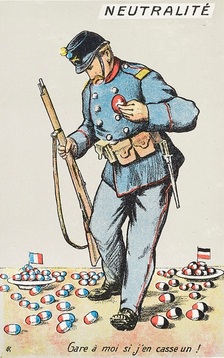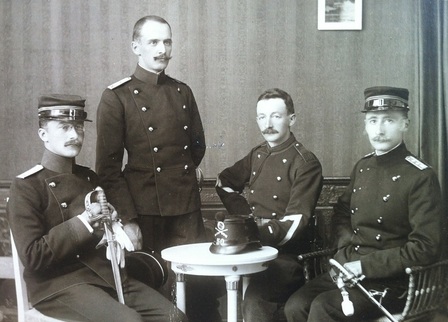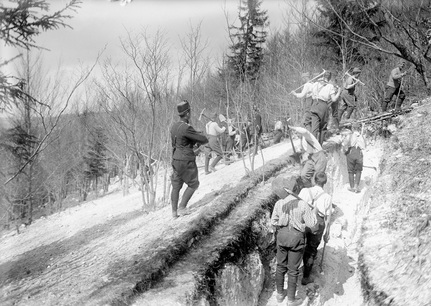
Left: postcard taking a satirical look at the position of Switzerland as a neutral. A Swiss soldier is surrounding by French and German eggs, and thinks to himself "I need to look out in case I break one!"
(photo courtesy of 14-18.ch)

Above is a photograph from Europeana1914-1918 showing four brothers serving in the Swiss army during the First World War. Left to right they are Paul, Walter, Ernst and Arnold Bloch. (image courtesy of Alexandra Bloch Pfister/Europeana1914-1918).

The photo above is just one of these, showing Swiss troops digging a firing trench on a steep hillside (image courtesy Swiss Federal Archives/Wikipedia Commons).
As the page title indicates, "Outbreak of war revealed divisions among the Swiss" is an interesting look at the varied reactions in Switzerland to the assassination of Archduke Franz Ferdinand, to the diplomatic crisis that unfolded over the following month, and to the actual outbreak of war. Politics, religion and cultural links were all factors in determining which of the belligerents an individual Swiss might have more sympathy for.
"War widens cultural divide in Switzerland" includes a video focussing on the Swiss army's wartime commander-in-chief, General Ulrich Wille. I had not realised before viewing this that in 1915, Wille proposed to the government that Switzerland should enter the war on the side of Germany and her allies. I also had not heard of the term "fried potato ditch" before (you will have to watch the video to find out what that means)! This video includes some interesting still photos and short films from the wartime period.
"1914: how war changed Swiss life" takes a detailed look at that subject, and incidentally uses this website as one of its sources!
"Swiss tell of horror in the trenches of 1914-18" looks at Swiss nationals serving with French troops during the First World War. As well as some Swiss who had adopted French nationality, there were also many Swiss in the Foreign Legion. Apparently at this time, just over one-third of the Legion's foreign troops was comprised of Swiss personnel. After the outbreak of war, it was estimated that some 300 Swiss-Germans and 500 Swiss-French or Swiss-Italians joined the Legion. Why? Anger at the German invasion of neutral Belgium is said to have been a major motivation.
Finally from Swissinfo.ch, "Swiss Air Force celebrates 100 years" tells how the Swiss Air Force was founded on 31 July 1914 at Bern, beginning with "nine pilots who brought their own planes and mechanics"!
Once this project has been completed, more efficient research methods can be developed and time will be saved in accessing the information. Thanks to the online application, anyone will be able to search the archives directly on the internet as of August 2014." This is exciting news for researchers. There is also an interesting free publication from the ICRC about their archives that is worth looking at.
 RSS Feed
RSS Feed
